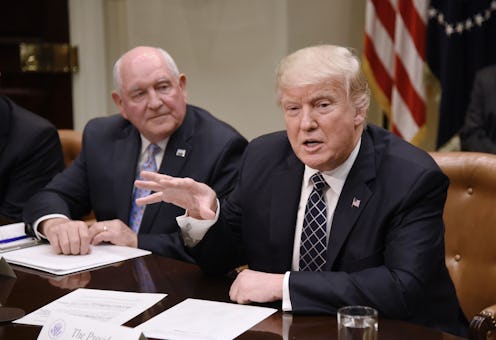News
The United States Will Not Withdraw From NAFTA At This Time

On Wednesday evening, the White House declared that Trump will not reject NAFTA at this time, after having a reportedly pleasant conversation with Canadian Prime Minister Justin Trudeau and Mexican President Enrique Peña Nieto about renegotiating it. The complex 23-year-old treaty connects three of the world's largest economies, and if Trump had decided to withdraw, as many had expected, it could have had a severe and lasting impact on the global economy.
NAFTA, which stands for the North American Free Trade Agreement, is a trade treaty between Mexico, Canada, and the United States that allows the three countries to trade freely between each other. First adopted in 1994, the agreement eliminated many tariffs between the three countries, established environmental protections against increasing manufacturing activities, and generally made it a lot easier for everyone to trade goods across borders.
Some, including Trump, blame NAFTA for decreasing the number and quality of manufacturing jobs in the United States. There's also evidence that the agreement hasn't been favorable for Mexico either. In 2014, The New York Times reported that since the treaty was established in 1994, Mexico's unemployment has risen, real wages have dropped, and annual per capita growth stagnated at a dismal 1.2 percent.
Trump's initial incentive for removing the United States from the treaty is simple — it's exactly what he said he was going to do. Throughout the campaign, Trump called NAFTA a "disaster" and proposed massive changes to free trade with the United States' direct neighbors. During a 2015 interview in the early days of the presidential campaign, Trump endorsed the idea of imposing tariffs as high as a 35 percent on certain goods manufactured in Mexico.
I am all for free trade, but it's got to be fair. When Ford moves their massive plants to Mexico, we get nothing. I want them to stay in Michigan.
But now, it looks as though he's holding off and trying to simply renegotiate the deal instead.
On the one hand, Trump's views on NAFTA make a certain amount of sense. On a basic level of economic theory, making tariffs high will incentivize American companies to bring back manufacturing jobs to the United States.
However, this is an extremely rudimentary understanding of how trade works. If prices on internationally manufactured goods rise dramatically, like by 35 percent, the purchasing power of the U.S. dollar would drop — American consumers wouldn't be able to afford what they could before, and the country could enter a recession as people tighten their pursestrings. The domino effect could depress the entire global economy, just as it did during the 2008 housing market collapse.
Additionally, the process of de-globalizing American companies would not be quick or smooth. Many American corporations have parts of their supply chain spread out around the world, and restructuring them within the new framework of whatever agreement will replace NAFTA could take years. There's also no guarantee that American companies would ultimately side with America — companies could choose instead to continue manufacturing their goods in other countries and adjust their target markets accordingly.
Terrifyingly, the American people can only hope that although Trump decided to keep NAFTA intact for now, he actually understands the full ramifications of potentially deciding to dissolve it in the future. During an interview with the Associated Press last week, Trump revealed that he didn't completely understand what NATO is when he called the international military alliance "obsolete" during the presidential campaign. Although unlikely, it's legitimately possible that Trump could have considered terminating NAFTA without a clear knowledge of how it would impact the United States and global economy.
It's extremely difficult to tell what exactly a withdrawal would mean if Trump changes his mind about renegotiations in the future. Economics is an imperfect science and there's a lot of room for uncertainty in even the most learned expert's predictions. What's absolutely certain, however, is that foreign policy shift would have a significant impact on the global economy as a whole. These three countries comprise the numbers 1, 10, and 15 economies in the world, and whether it's through investor wariness on the global markets or the real-world changes in trade, Trump eliminating NAFTA would have drastically changed things. For now, however, Americans can breathe a sigh of relief as the alliance will remain.